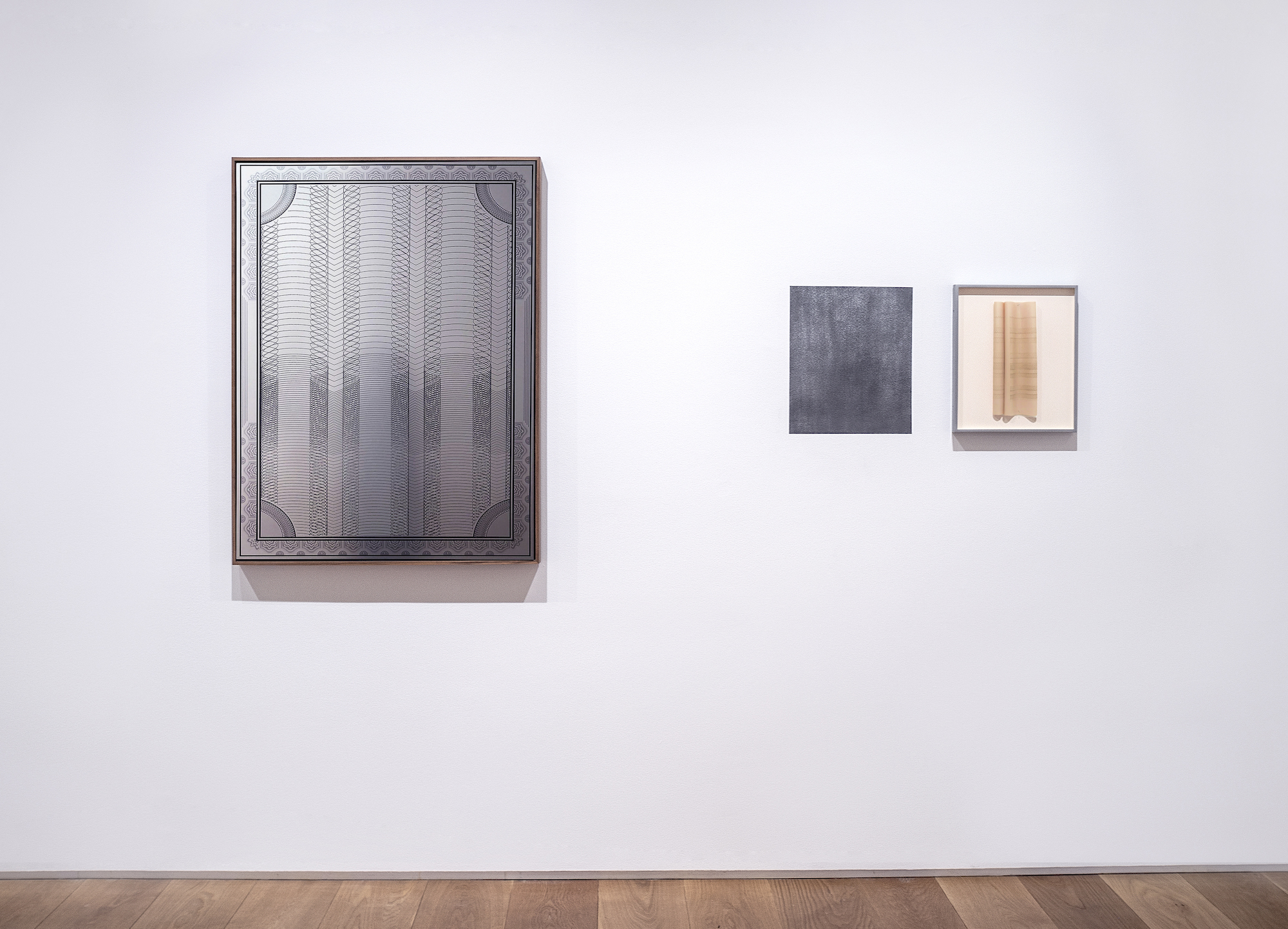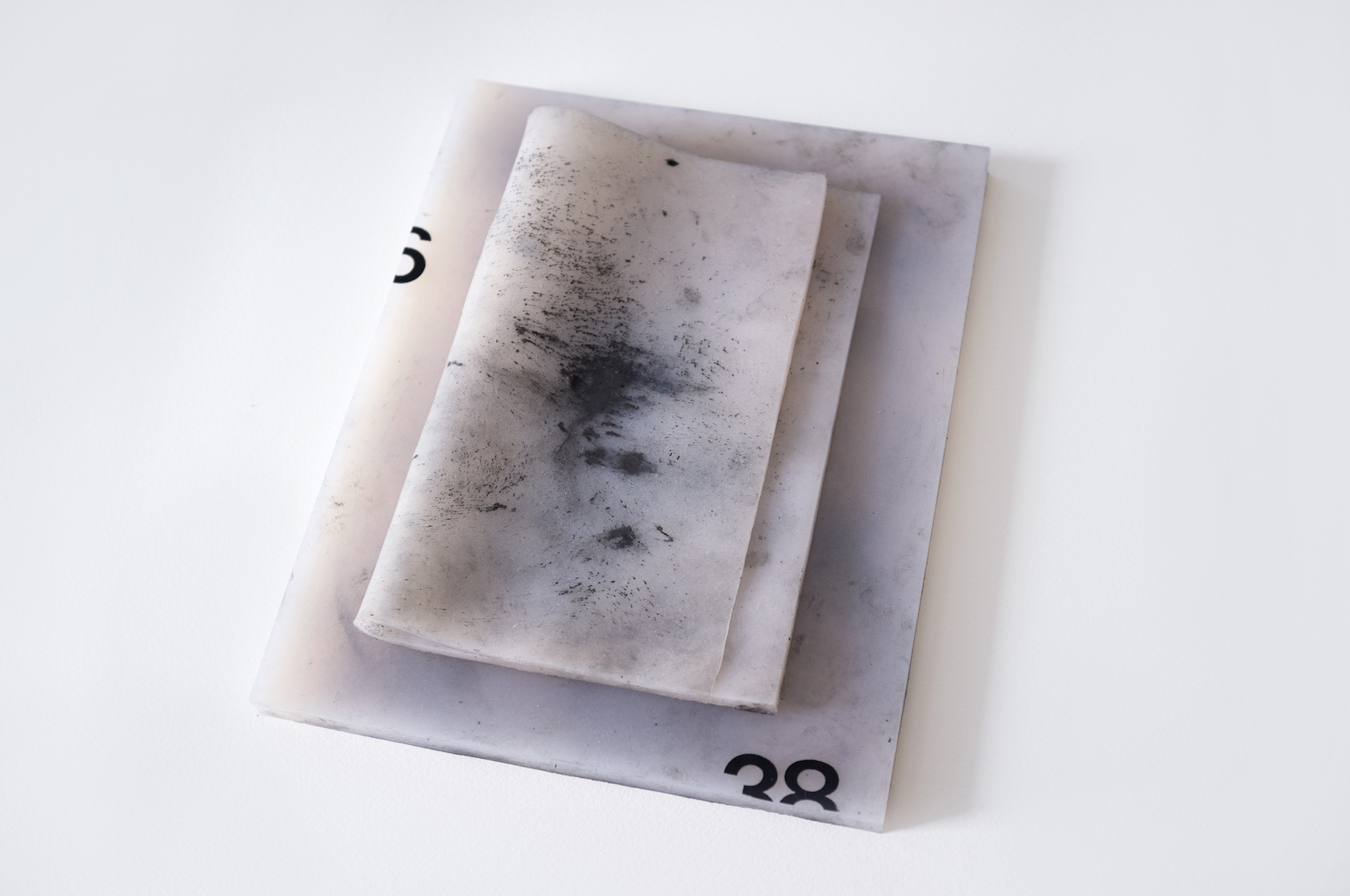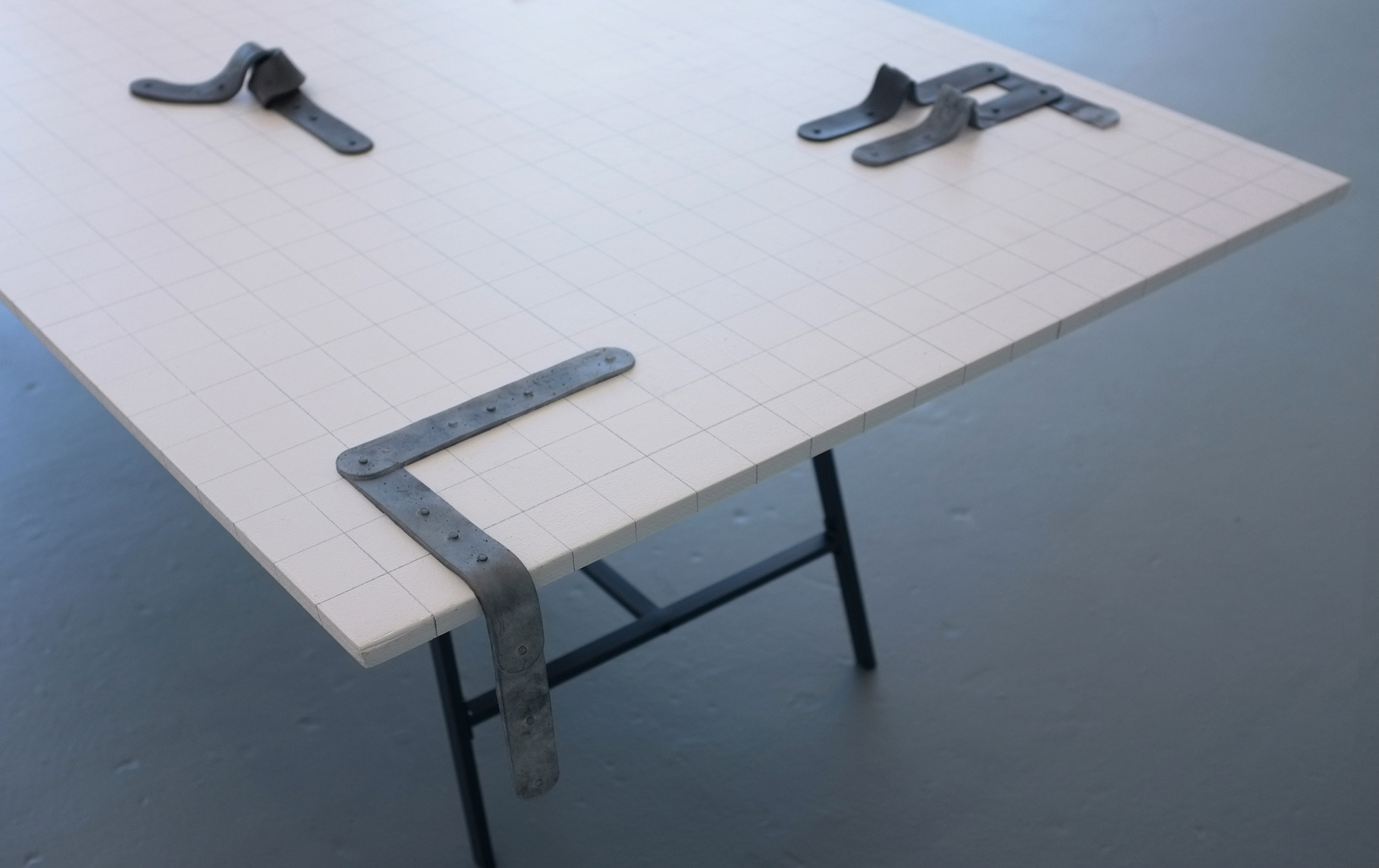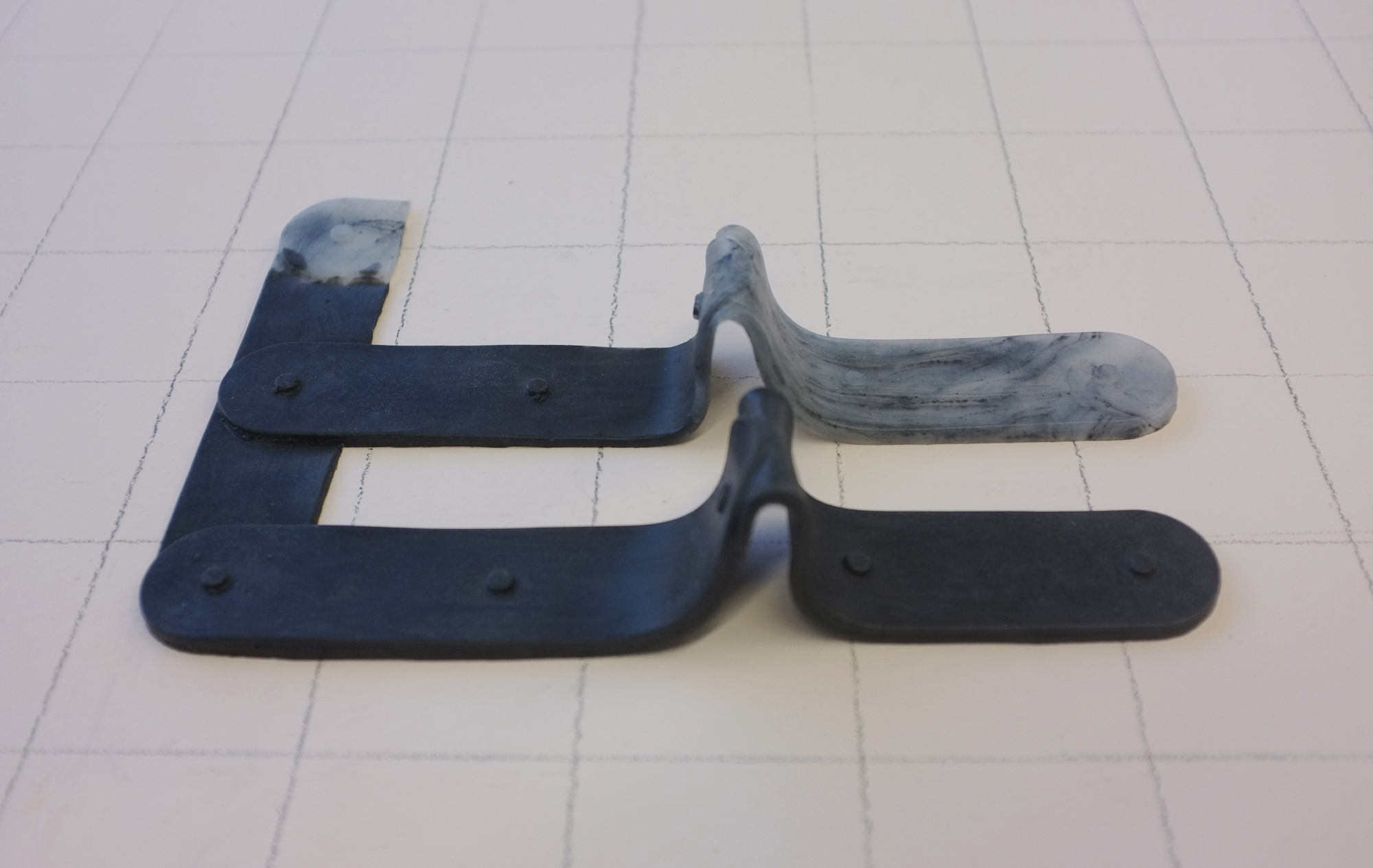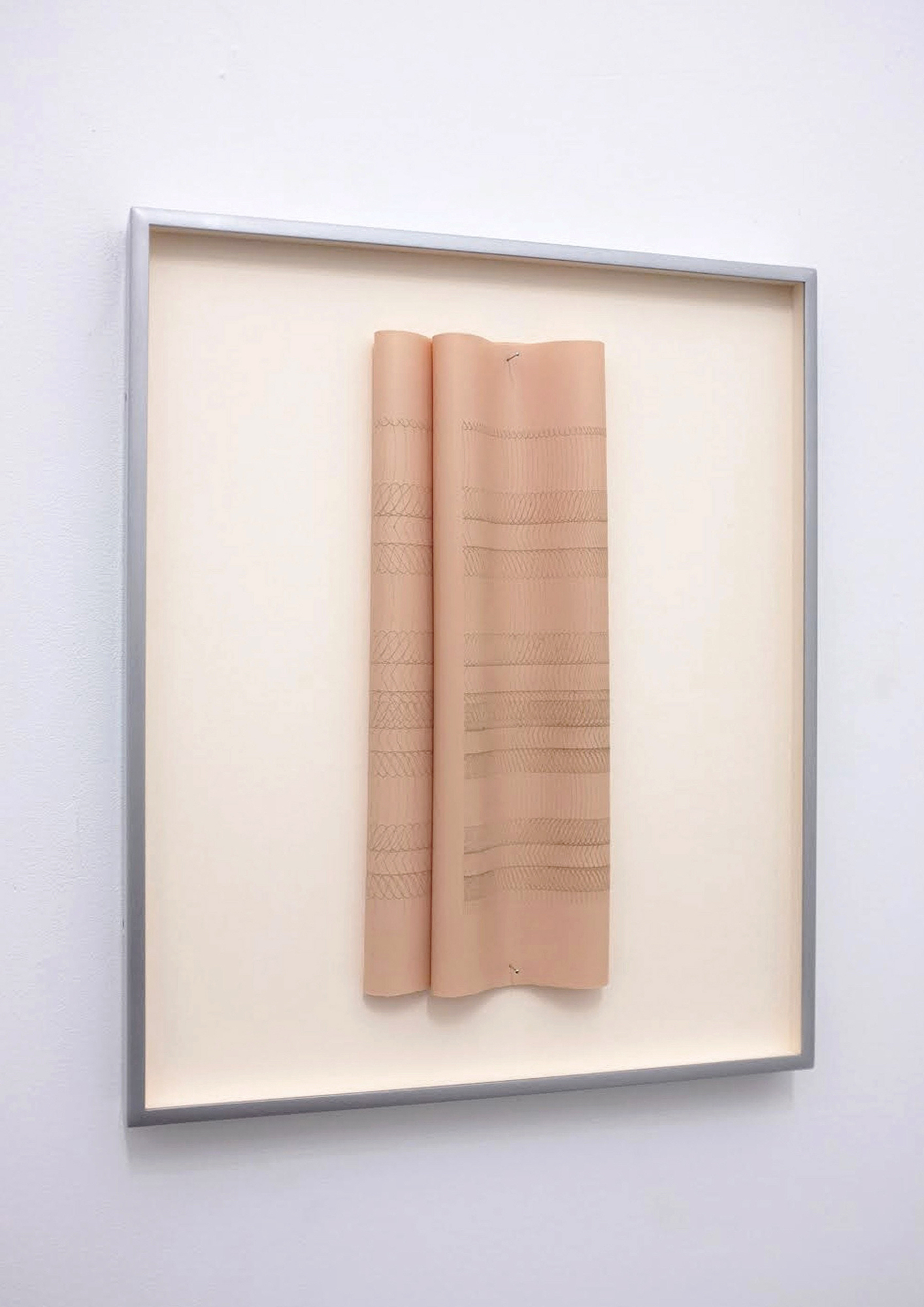Jesse Chun: Know What I Mean?
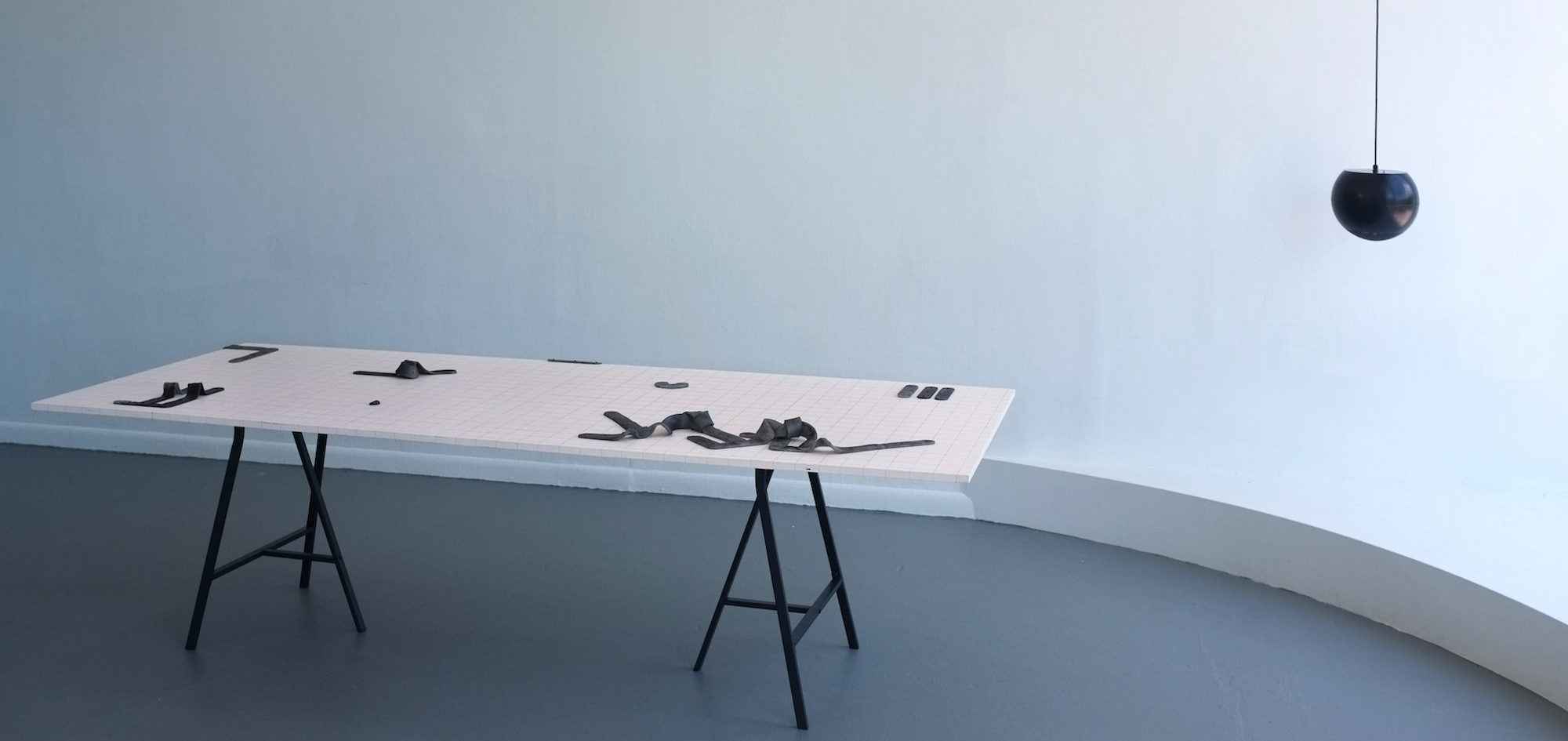
Jesse Chun, enunciating silence and, 2019, graphite, silicone, wood, paint, steel trestles, 36 x 80 inches [courtesy of the artist]
Share:
Jesse Chun’s visual art practice, which focuses on questions of translation and translatability, finds expression in installation, video, sculpture, sound and publishing. We met in her studio to talk about the lived experience of globalization and how it has structured her perspective and work as an itinerant international artist.
Cora Fisher: You mentioned in passing that you’re from four different countries. How many languages do you speak?
Jesse Chun: I have lived in multiple countries, but I don’t know that I can say that I am “from” them. Only two: I speak Korean fluently—well actually, my Korean is pretty bad now, but I can speak it.
CF: Is that your first language?
JC: Yeah. I guess I speak English, and a little bit of French, but it’s really bad, it’s school French, you know? So I think it’s technically two. I moved to Hong Kong from Korea when I was nine, mainly because of my dad’s business. And the funny thing is he actually taught himself Japanese and Chinese, and he speaks English from learning it in school. He taught himself because he wanted to get out of Korea, and for him, language was the way out. He wanted to be a poet, and my mom was like, you need to go get your MBA, so then he got forced into doing business. And then he did a corporate job, and he wanted to get out of there, because he always felt really oppressed by the system there. And so he taught himself languages, and he got a job doing international business because of his language skill.
CF: He sounds like a real polymath. And this also sounds like the proverbial immigrant story, that you’re living out your parent’s dreams, your father’s dreams.
JC: Yeah, totally. Because I published that book of erasure poems with Booklyn Press, and I’ve done some publications with different independent publishers, and when I sent my dad the poem book, he was really moved, because, you know, he wanted to be a poet. It felt like he was living through me.
Jesse Chun, translations (on evidence, untranslatable futures, and other drawings), installation view 2019 [courtesy of the artist and The Drawing Center, NY]
CF: These are poems you have redacted from immigration documents.
JC: Yeah.
CF: And this is something you do in your practice a lot, you disarm or alter this kind of bureaucratic source material. I’m looking now at a carpet that’s an abstraction of scantron bubbles, which recently reappeared in a kind of digital essay that you did for Triple Canopy as a kind of Mondrianesque pattern. It’s very pleasing to look at, and it also really makes me think about the failure of this kind of Western paradigm of enlightenment and modernism, how hegemonic it really is and how white and Eurocentric it really is.
JC: Definitely. I think a lot about Western hegemony in my work, likely because I grew up in Hong Kong when it was a British colony, and so I remember moving from Korea to Hong Kong and being like, “Oh, why is our governor white?” You know, because I’m still in Asia. And then I actually witnessed the handover in 1997, and I remember just leading up to it we’re all wondering, what’s going to happen to the country? And now in Hong Kong what’s happening is really heartbreaking. Every day I’m checking the news about the protests, and my heart feels heavy witnessing what’s going on from far away—but back in 1997, I remember just being there, sitting in the same spot [where] I was every other day, but then flags were changing. They have this whole ceremony, and the flags come up and down, you know, the British one comes down, and then the new China one goes up. And then the British government people leave on this ferry. It is this huge royal boat—the HMY Britannia—and after they fold the flag and give it to Prince Charles, they all board on it and they wave goodbye.
CF: Unbelievable.
JC: And the governor, Chris Patten, and his daughters went to my friend’s school, and my friends knew them, and you see them crying on the news, ’cause Hong Kong’s their home and they’re getting kicked out, basically.
CF: But isn’t it also like, “Cheers! It’s been grand”?
JC: I mean, this whole spectacle, it was like a fucking political drama or political theater really. And so I grew up thinking a lot like, wow, this whole system of government and institutionalization of everything, it can just change overnight. It made me lose faith in it at a very early age, ’cause I was like, I’m in the same country, and it’s now a different country. And then over the next few weeks, the currency changed, all the holidays were gone—the British holidays were gone, Queen Elizabeth’s no longer on the coin—all the symbolism changed, and so I grew up really being aware of symbolism and bureaucracy and all these different structures because it was so embedded in my experience. Thinking about colonialism, I was living in it in the 90s.
CF: And to see this spectacle being staged, it’s kind of like Brechtian alienation, and to me that’s the immigrant experience, also. It’s what many new Americans or any newly assimilated people really face. What’s so powerful, too, is that as an artist, it’s really productive. I feel like it’s a basic ingredient of being an artist; you need that alienation. And so many people experience it existentially without making work about it, and they raise families, and they do so many things. You know, there’s something about using and recognizing the kind of latent power of being other or being uncomfortable or just having that distance [so] you’re like, this is a spectacle, this is insane how it’s being orchestrated and how it’s being encoded and what I’m being told to believe or feel, and I know that in fact this is all fiction that’s kind of unspooling before my eyes.
JC: Right. And the idea of the correct way to be, the correct ways of language, the correct way to spell, the idea of what’s correct and ideal has always been: I don’t believe it. It seems so arbitrary, because if you’re in an American school, you spell color without a U, but then if you’re in the British system, it’s like, even that concept of what’s correct is always changing. It depends on where you align yourself. So, I’m really searching for that in-between space, you know? I think a lot about how Édouard Glissant wrote about opacity and our right to claim opacity. In that same way, a lot of my work is claiming that space for myself and for people who are navigating that right now, so that there’s space that’s more open to translation, and it’s not so legible.
Jesse Chun, valid from until, 2019, graphite, silicone, letraset, 11 x 8.5 x 1.5 inches [courtesy of the artist]
CF: It’s interesting because so often we talk about art and who is it accessible to and who is it for and who is the audience? And, you know, a big critique of the art world is it’s too theoretical, it’s too insular, but there’s something about your work that’s so open and accessible—as much as you’re playing with opacity—that’s really about a kind of multivocal language or polyvocal possibility to experience language. And part of it, in the poetry and also some of the video work you’ve shared with me, it’s about pointing out these weird, arbitrary discrepancies.
For instance, in your video piece WORKBOOK, there’s a whole section that’s really humorous, where a landscape is pictured and then a generic tutorial voice proclaims, “globalization” among other meta-concepts. Tell me a little bit about that work and how it came about.
JC: I feel kind of torn between two languages, because now I’m more fluent in English than Korean. So, when I try to talk to my parents, especially about my work, I can’t even explain it in Korean. I don’t even have the vocabulary for it. I’m in a no man’s land in the way I navigate language. Sometimes, to liberate myself, I look at language visually. That’s when I started thinking about how the L to me looks like the Koreanㄴ. And how, depending on who looks at the written language, it really could mean so many different things. The same way I’m reading imagery, I’m reading text. So, that’s why I decided to misuse.
Also, I like the idea of mistranslation as an active tool for poetics. I kind of like doing the opposite of what I’m supposed to do and fucking with it, so I misuse the Google translator, using animations. The translation I was doing, I was actually just recording my desktop, but later you see the ocean come in that’s digitally animated. But I really was interested in trying to enter language through the multilingual, not just in other languages, but also through visual language. Because I think language is not just written and spoken. That’s also why I’m working with sculpture now; the materiality of language is so physical. And whether it’s the violence of it or the joy of it, I feel like there’s a lot of different ways you can experience language. Language is so complicated, and I don’t just want to make my work text-based, because I think there’s a lot that the text can’t say about language.
CF: To go back to opacity, I’m looking at a piece on the floor that looks like a slab of marble, and it is, in fact, a solid, rectangular slab of latex that has graphite swirled in it.
Jesse Chun, enunciating silence and, 2019, graphite, silicone, wood, paint, steel trestles, 36 x 80 inches [courtesy of the artist]
Jesse Chun, enunciating silence and, 2019, graphite, silicone, wood, paint, steel trestles, 36 x 80 inches [courtesy of the artist]
JC: Silicone, silicone.
CF: Silicone, and the letter T is arrayed in different orientations, and there’s one thick slab of silicone, and then there’s a folded-over thin skin of the same material. It looks like a marble book, and very imposing, but then you reveal to me that it’s really like a fleshy, synthetic blob.
JC: Totally, and then it’s on the floor, but it looks like an important thing that should be on a pedestal, at least the way it’s shaped, you know.
CF: I like that. You’ve also been doing a lot of these kind of formal, rearticulations of watermarks from passports and other documents and creating imaginary landscapes out of [them]. And beautiful grids out of Scantron test bubbles. It’s really interesting to see the threads amongst all these different physical materials, and also, as much as you try to capture something ephemeral in language, it’s all about this kind of plasticity and movement and instability—what it means to not know, what it means to not say the “right” English.
JC: When I learned English, I think because I learned it through different systems—Canadian, American, British systems, various educational systems—and then, learning it while you’re in a British colony, my relationship to it has never been a neutral experience. Because I was always an outsider, I thought of English—well, first of all, I was taught that if you don’t learn to speak this thing, you can’t enter the regular school program, so I’m like, fuck, I need to survive, you know? Also because my dad was doing international business because of language, I think I was a byproduct of globalization, that global economy. Even when I think about language, or English, I keep thinking about how it’s not just about a political agency, but also a financial thing, because in Korea, you can’t get a good paying job without speaking English. So, kids are sent to English academies before they can learn Korean now.
CF: So, there’s a whole class thing, in terms of who has access to this education.
JC: Absolutely. Everyone in Korea goes through hagwon, which is an academy, and you learn English. It’s almost like they fetishize English as, like, symbolism of being cultured, Westernized, and being a certain class or whatever, so I just think about how the rest of the world, a lot of non-English-speaking countries, are still trying to assimilate, to be able to speak this lingua franca, because that grants you this global access. And I think a lot about how, technically, I think I read last year that there are more non-English-speakers in the world than English speakers, but it’s still the world’s global language. I understand that hegemony will always probably be there. Even if it turns over to another country or another language, there are these power dynamics, but I think specifically the English language is tied to imperialism and why this language spread, so I think a lot about how we can’t really separate ourselves from that. Actually, I’m making a new video work right now that’s thinking about the first English school in America, the first ESL school in America, which it was actually started by Henry Ford.
CF: What? Like, Ford Motors?
JC: Yeah, it was called the Ford English School. But the first ceremony they did—when they gave the certificate to finish the program—they had this giant cauldron, and they made the immigrants wear their native garments and go in the cauldron as a symbolism of being purified of their impurities.
CF: What!?!
JC: This sentence was on the website, yeah.
CF: And this was a literalization of the melting pot?
JC: Yeah. They called it the melting pot as a gesture of …
CF: Ethnic cleansing.
JC: Yeah, ethnic cleansing and, like, capitalist baptism. And then, when they [arose] from the cauldron, they were handed an American flag and a certificate.
CF: Unbelievable.
Jesse Chun, translations (on evidence, untranslatable futures, and other drawings), installation view 2019 [courtesy of the artist and The Drawing Center, NY]
JC: Yeah, this is why I’m fucking with certificates right now, all the watermarks of certificates of diplomas, because I think I can’t see those lines apart from their violence. I think there’s inherently this embedded violence that we don’t even think about, that we don’t know, but the history’s there.
CF: Right. It’s like, who’s granting this power? Who’s bestowing this certificate upon you?
JC: Absolutely. A lot of it’s about power dynamics. As an artist, I’m interested in thinking a lot about unveiling how language is not neutral. I really am interested in rearticulating, redacting, and retranslating. I kind of think of my role as an artist as being a translator. I’m translating pre-existing symbols and systems and watermarks and documents, and then I’m really interested in translating them into new narratives and poetics. I’m hoping that my poetics are things that include or that are from a more diasporic space or that isn’t just upholding one hierarchy.
CF: Yeah, well, I think a lot of the power of this work comes from it showing the gaps and the cracks and the confusions of the sticking points of language that arise out of the act of learning and trying to assimilate them. English, in particular, is just a minefield of linguistic exceptions. It’s such an odd hybrid language. My mom is an immigrant, and lived here for 35 years, and never lost her accent, and her experience is very structured by that. There’s a way in which this doctrine of assimilation is really, really violent. As you said, it does have economic consequences. So, how do you feel this work might potentially be read in different countries, places, contexts, as a globalized emancipated artist.
JC: I don’t feel that way. I feel trapped, haha.
CF: I think we all feel trapped. But each in our special way, I’m sure.
JC: No, of course. That’s true.
CF: But do you think about the way in which this work might move in a different cultural context or in an art world?
JC: I’m a fucked-up translator. I guess dysfunctional.
CF: So how does that capacity and that kind of attention you bring to language, how might that be experienced in different places? Do you think about it?
JC: Yeah, I do, and I’ve met with certain spaces in Asia, but I haven’t actually exhibited in Asia yet; just one group show, but not really. So I’m curious how this work will be read there. I can’t actually speak for the global thing, because I’ve been mostly exhibiting in North America. Sadly, I haven’t been able to leave the US much, because of my visa, because I’ve been on artist visas here, and now I just applied for [a] green card, so I can’t leave the country. So, throughout the last few years, I’ve been on land lock a lot. So, I can’t really speak to how the art would be received in a global sense.
I will say, in New York, a lot of people are from different backgrounds. I think there’s a common sense of relief that people relate to in different ways. It’s really different people [who] connect with it. So, I am hoping that this work does create an inviting space, because it’s legible and illegible. I guess it’s about the untranslatable.
This review originally appeared in ART PAPERS Winter 2019/2020 “Global(isms).”
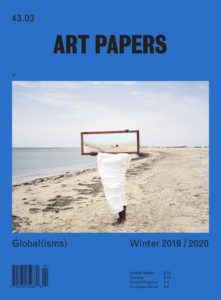
Jesse Chun is a conceptual artist working in video, sculpture, sound, installation, and publishing. Venues for her recent and upcoming exhibitions include SculptureCenter, Queens Museum, The Drawing Center, The Bronx Museum of the Arts, BAM (United States); Oakville Galleries (Canada); and the Nam June Paik Art Center (South Korea). Select public collections include the School of the Art Institute of Chicago, Artist Book Collection; the Smithsonian Institution, Archive of American Art; Cleveland Clinic Art Collection; Yale University Library, and Asia Art Archive in America. Her most recent digital publication, WORKBOOK, was published by Triple Canopy (2019). She works and lives in New York.
Cora Fisher is a curator and arts writer based in New York City. She is currently Curator of Visual Art Programming at the Brooklyn Public Library. From 2013 to 2017 she was the curator of contemporary art at the Southeastern Center for Contemporary Art (SECCA), where she organized more than 20 solo and group exhibitions, plus numerous performances and programs, and she produced four print publications. She has contributed reviews, profiles, interviews, and conversations to Artforum.com, Bomblog, The Brooklyn Rail, Hyperallergic, New York Times Blog, Objektiv, Momus, and The Rumpus, among other publications. She holds a BFA from The Cooper Union School of Art and an MA from the Center for Curatorial Studies, Bard College.
